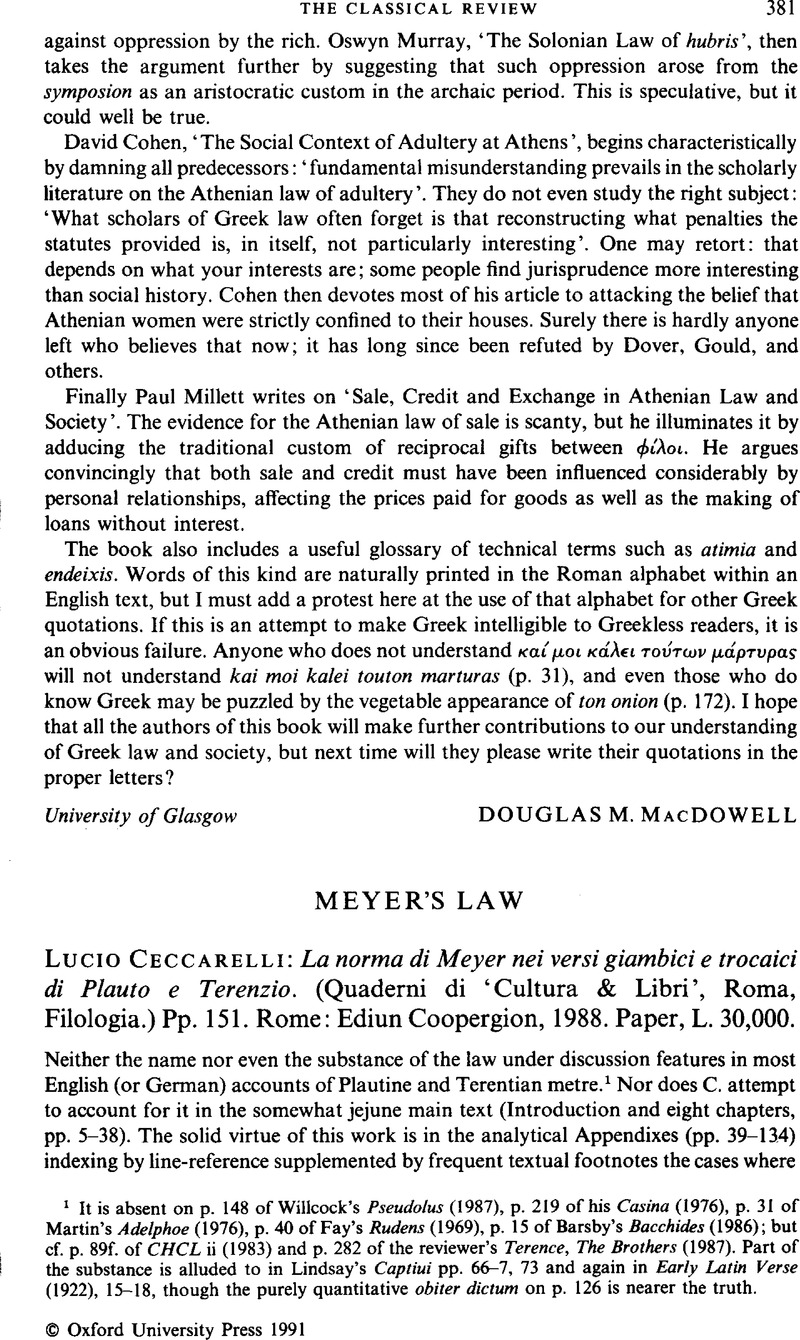No CrossRef data available.
Article contents
Meyer's Law - Lucio Ceccarelli: La norma di Meyer nei versi giambici e trocaici di Plauto e Terenzio. (Quaderni di ‘Cultura & Libri’, Roma, Filologia.) Pp. 151. Rome: Ediun Coopergion, 1988. Paper, L. 30,000.
Published online by Cambridge University Press: 16 February 2009
Abstract

- Type
- Reviews
- Information
- Copyright
- Copyright © The Classical Association 1991
References
1 It is absent on p. 148 of Willcock's, Pseudolus (1987), p. 219Google Scholar of his Casina (1976), p. 31 of Martin's Adelphoe (1976), p. 40 of Fay's Rudens (1969), p. 15 of Barsby's Bacchides (1986); but cf. p. 89f. of CHCL ii (1983) and p. 282 of the reviewer's Terence, The Brothers (1987). Part of the substance is alluded to in Lindsay's Captiui pp. 66–7, 73 and again in Early Latin Verse (1922), 15–18, though the purely quantitative obiter dictum on p. 126 is nearer the truth.
2 ‘Ueber die Beobachtung des Wortaccentes in der altlateinischen Poesie’, Abh. d. philosoph.- philohgischen Classe der kön. Bayerischen Akad. 17.1 (1886), 1–121, esp. 42ff.
3 ‘Bemerkungen über die Beobachtung des Wortaccentes im älteren Lateinischen Drama’, Philologus 46 (1888), 401–20.
4 In Plautus and Terence ‘das griechische Dipodiengesetz gilt…nicht; ihm ein lateinisches Dipodiengesetz… an die Seite zu stellen, war ein Irrtum, der leider noch immer nicht ganz ausgerottet ist’, Einführung in die römische Metrik, Darmstadt, 1967, 30; this unlovely sentence alludes to French scholars such as Nougaret and Perret, perhaps also the Italian C. Questa, whose Introduzione alia metrica di Plauto appeared the same year.
5 Cf. n. 1. Harsh, P. W. in his Iambic Words and Regard for Accent in Plautus (1949)Google Scholar and Raven, D. S., Latin Metre (1965), p. 55 follow Lindsay's line.Google Scholar
6 The striking way in which Bentley evokes a metrical argument out of the air in favour of his conjecture at Hec. 280 filium…expeto ut redeat domum (expecto ω Don.) (the decisive merit of which is in the sense, not the metrical consideration) in the last two sentences of his Σχεδ⋯ασμα de metris terentianis in Terenti Comoediae, Cambridge (1726), p. xix, is the declaration of a man trailing his coat and saying ‘I recognize that there is more to the question of the differentiation of odd and even feet in Terence than I have let on here in this sketch in usum Delphini’, and is of a piece with his deliberately avoiding even stating again let alone elaborating the complementary point noted by him en passant in his note on Hor. Sat. 2.5.79 (Cambridge, 1713) that regardless of word-end Roman poets were notably in favour of …--⌣-/ and averse to the cadence … ⌣-⌣-/ in any form; it was A. Luchs, ‘ Quaestiones metricaeReviews in Studemunds Studien auf dem Gebiet des archaischen Lateins t. 1. fasc. 1, Berlin 1873, 3–75 who sharpened that observation to the character of the rule involving word-end stated below which even some of those mentioned in n. 1 communicate to the beginner.
7 / means ‘unaccented word-end’, not ‘foot-boundary’, which we are indicating with “ ' ”
8 Cf. Soubiran, J., Essai sur la versification dramatique romaine, Paris, 1988Google Scholar.
9 Except for Catullus' and others' pure iambics (e.g. Cat. 4), mere jeux d'esprit, and especially for Horace's Epodes, in which the author had two quarrels, not one, with the older poets' approach: for Horace not only insists on c D passim more graeco, but also objects to the traditional Roman preference for A B as against a B, and makes a point of lightening his verse by re-promoting a B c D passim to something like the status that it had in Greek, especially in cadence. Seneca was totally unaffected by the latter reformation. Horace positively rejects Luchs's law, but we can hardly say that Seneca observes it, since… a B c D / in any form is no longer acceptable to him.




